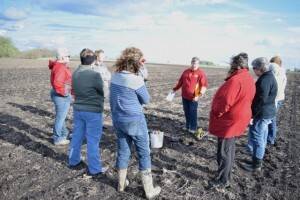![Soil Sampling[3]](https://www.lathamseeds.com/app/uploads/2017/01/Soil-Sampling3-e1485812566714-225x300.jpg) Twenty-eight years ago when Angela Rieck-Hinz went door-to-door introducing herself to farmers, the men didn’t think she was calling on them.
Twenty-eight years ago when Angela Rieck-Hinz went door-to-door introducing herself to farmers, the men didn’t think she was calling on them.
“On the first field call I made as a soil conservationist, the farmer answered the door. Before saying anything to me, he turned to his wife and said, ‘The Avon lady is here’,” she recalls. “I just laughed and turned what could have been an awkward situation into an opportunity. I completed his conservation plan, and we became friends.”
Nearly three decades later, Angie still encounters situations where people are surprised to learn their Extension field agronomist is a woman. She says women can’t take it personally nor let it bother them. She takes the time to listen, ask questions and learn about each farmer’s situation. Then she asks about his or her goals and challenges before offering suggestions or solutions.
Setting goals and striving to achieve them is something Angie learned through 4-H. Originally from Benton County in eastern Iowan, the Rieck family moved to southwestern Wisconsin when Angie was 11. Her mother took a job in town, which provided a steady income and health insurance. Her father bought a farm where he raised about 100 acres of crops plus ran a cow-calf herd and raised hogs farrow-to-finish. He also sold seed. Angie remembers her dad returning from “seed corn school” sometime around 1980 with a book entitled “Modern Corn Production.” Fourteen-year-old Angie was so fascinated with the content that she read the book cover to cover.
 “At that time, I didn’t know it was possible for a girl to become an agronomist,” says Angie, who is in her fourth year as an ISU Extension Field Agronomist serving 9 counties in north central Iowa. She served as a manure management specialist for nearly 20 years on campus at ISU before changing positions. “All my friends were interested in becoming teachers or accountants. During my first semester of college at UW-Platteville, I met two girls who begged me to be on the soil judging team with them. I started taking agronomy classes and enjoyed them so much that I became an agronomist.”
“At that time, I didn’t know it was possible for a girl to become an agronomist,” says Angie, who is in her fourth year as an ISU Extension Field Agronomist serving 9 counties in north central Iowa. She served as a manure management specialist for nearly 20 years on campus at ISU before changing positions. “All my friends were interested in becoming teachers or accountants. During my first semester of college at UW-Platteville, I met two girls who begged me to be on the soil judging team with them. I started taking agronomy classes and enjoyed them so much that I became an agronomist.”
Throughout her career, Angie says she’s had the pleasure of working with many people who wanted to see her succeed. They provided her opportunities to grow professionally and encouraged her to take on some challenging aspects of programming that wasn’t popular at the time.
“What I enjoy most about my job is the people I meet,” says Angie. “Every day I meet new people and talk with those whom I have developed long-standing relationships. I’m glad to see so many women engaged in agriculture as retailers, seed sales professionals, agronomists, veterinarians, commodity analysts, livestock specialists and more. I’m also willing to help them in any way I can. The Avon lady may no longer call, but don’t be surprised when your female ag professional comes knocking.”
![IMG_0562[2][1] copy](https://www.lathamseeds.com/app/uploads/2017/01/IMG_056221-copy-225x300.jpg) Three years ago Angie started a women’s cohort with the goal of reaching more women landowners, farm women, female retailers and others who wanted to learn more about agronomic principles, crop production, water quality and conservation practices.
Three years ago Angie started a women’s cohort with the goal of reaching more women landowners, farm women, female retailers and others who wanted to learn more about agronomic principles, crop production, water quality and conservation practices.
“There are many female landowners who want more knowledge to be able to better communicate with tenants. There are women who farm and women who are married to farmers, who want access to more information so they can increase their skills and improve communications,” says Angie. “We look at planting practices, crop growth and development; we talk about making replant decisions; we identify weeds, insects and disease; we discuss pest management principles and how to scout to make treatment decisions; and we talk about different conservation practices and impacts on water quality. We learn about soil fertility, soil sampling, how to make your own fertilizer recommendations, GMO crops and what that means for our food supply. It’s really a lot of fun!
Angie will start a new cohort in April 2017. The group will meet at the ISU Field Extension Education Laboratory (FEEL) between Ames and Boone every other week throughout the growing season for about an hour. Her colleagues, Meaghan Anderson and Rebecca Vittetoe, will also host new cohorts in Iowa County and the McNay Research Farm. For more information about any of these cohorts, contact Angie at 515-231-2830 or amrieck@iastate.edu.
